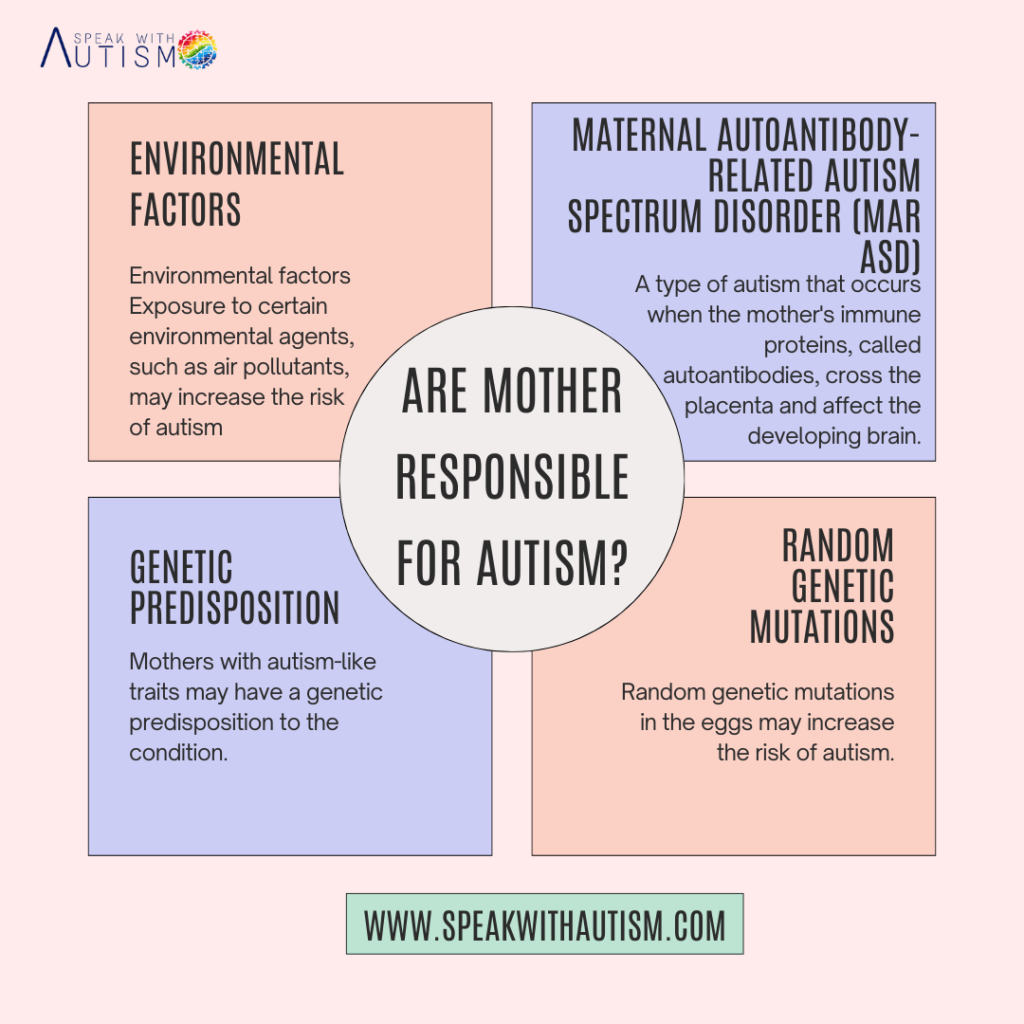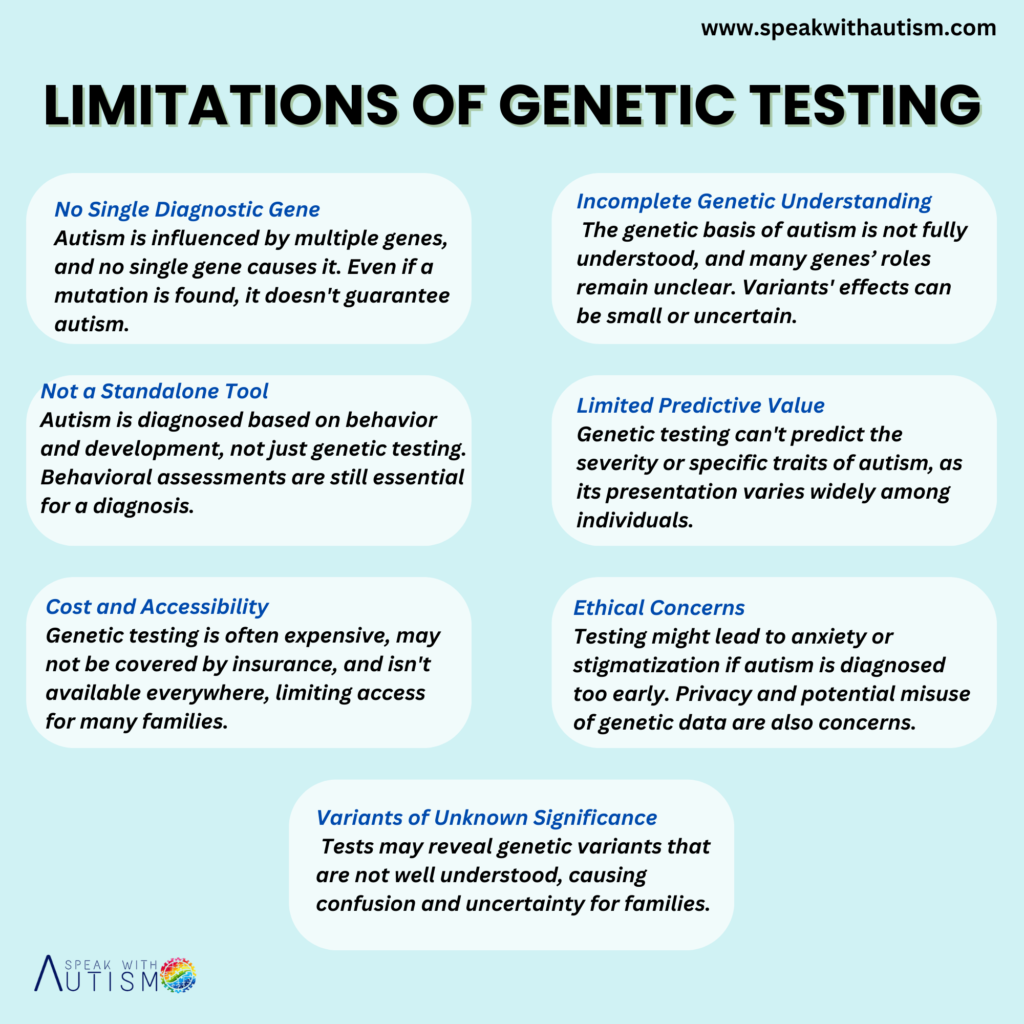Many questions often arise about autism, such as how autism develops, whether it is the father’s responsibility, Are Mother responsible for autism? can autism go away? if it is caused by something during pregnancy, environmental toxins, or environmental exposure, or if it is genetically transferred. In this blog, we will discuss these questions in detail. Autism is a complex neurodevelopmental condition that manifests differently in every child. The question often arises whether parents, especially mothers, are responsible for their child’s autism. This blog aims to bust this myth and present a scientific perspective.
Table of Contents
Causes of Autism: A Complex Scenario

Genetic Factors
- Research suggests that autism may be partly genetic.
- Gene variations inherited from the mother may increase the risk of autism, with up to 50% of cases being similar, but this is not certain.
- Genes inherited from the father may also have an equal effect.
Environmental Factors
- Environmental factors, such as toxins, medications, or infections during or after pregnancy, may potentially increase the risk.
- Research has not yet been able to clarify whether autism is caused only by environmental factors.
Are Mother responsible for autism?
1. Ways Mother give autism to a child
- Maternal autoantibody-related autism spectrum disorder (MAR ASD)
- Genetic predisposition
- Random genetic mutations
- Environmental factors

2. Gene Inheritance
The occurrence of autism lies at the intersection of genetic and environmental factors. Research suggests that genes can increase the risk of autism. Certain genetic variations have been identified that may contribute to the development of autism. However, does this mean that autism is directly inherited? Not necessarily. Autism does not follow a simple inheritance pattern like some other conditions, such as sickle cell anemia. Instead, it involves the combined role of multiple genes and environmental factors.
3. Maternal genetics
While it is true that autism can be influenced by genetic factors from both parents, it is important to understand that maternal genetics are not solely responsible. Both the mother’s and father’s genes contribute to a child’s development. Research shows that some genetic mutations associated with autism can be inherited from either parent, but it is incorrect to assume that autism arises solely from the mother’s genes.
4. Epigenetic Factors
During pregnancy, maternal environmental exposure and health can impact the baby, which may increase the risk of autism. For instance, factors such as infections, nutritional deficiencies, or exposure to toxins during pregnancy can elevate the risk of autism. However, this is not a matter of direct genetic inheritance.
5. What Does Research Say?
Studies indicate that the heritability of autism is high, estimated to be between 50% and 80%, highlighting the significant role of genetics. However, identifying specific inherited patterns remains challenging. Advanced research is continually exploring the connections between genetics and environmental factors.
6. Autism: Not a Fault but a Neurological Variation
Autism is not a result of anyone’s fault but rather a unique neurological variation. With the understanding and acceptance of parents and the community, individuals with autism can experience significant improvements in their lives.
Limitations of genetic testing

- Gives accurate results only up to 72%.
- There is no full-proof method yet to confirm parental or other causes.
Why parents should not be blamed
- Social myth : Many times in society, the mother is held responsible, while there is no scientific evidence of this. This blame can affect the mental health of the parents.
- Example of regression autism: Many children who develop normally in the beginning may later show symptoms of autism due to regression. This does not mean that the parents are to blame for this.
Understanding and accepting autism
- Autism is not a disease, but a different way of functioning of the brain.
- Many autistic children are gifted. Their abilities and skills can be unique.
- Early intervention helps to develop the potential of children.
- In 90% of the cases, children make significant progress if they get timely help.
Tips for parents
Don’t blame yourself
- It is important to accept that autism is not anyone’s fault.
- With self-dedication and self-love, you can do better for your child.
Get the right information and support
- Consult professional therapists and doctors.
- Increase engagement and exposure with children at home.
Spread awareness in society
- Break myths and share correct information.
- Support other parents.
Conclusion
It is wrong to blame parents, especially mothers, for autism. Scientific research so far debunks this myth and proves that the causes of autism are complex. The solution is to understand this condition, accept it, and take the right steps.
Are you ready to change your thinking? Let’s break the myths of autism and embrace the truth.
Frequently Asked Questions (FAQ)
Is there a genetic test for autism?
Currently, there is no specific genetic test that can give a perfect diagnosis for autism. Autism spectrum disorder can have multiple causes, which are related to both genetic and environmental factors. Some genes may be related to it, but research is still in the early stages. Genetic testing can be used to identify specific conditions, such as fragile X syndrome or Rett syndrome, but these are rare and do not apply to all types of autism diagnoses. Autism is primarily diagnosed based on behavioral assessments and developmental evaluations.
Is autism genetic or hereditary?
Autism can be both genetic and hereditary, meaning some people may have autism-related genes that they inherit from their family, such as from their mother, father, or grandparents. If there is a history of autism in a family, the risk of autism in their children can be higher. However, autism is not solely dependent on genes; environmental factors also play an important role in the development of autism. Stress, anxiety, depression, or exposure to environmental toxins during pregnancy can be contributing factors. Therefore, autism is a complex combination of genetic and environmental factors.
Is autism genetic?
Yes, autism can be largely genetic. This means that if a family member has autism, their children are more likely to have autism. Research has shown that specific genes may be responsible for autism, but it is quite complex, and these genes can differ in each case. However, autism is not only genetic; environmental factors also have an effect, such as things during pregnancy, like stress, anxiety, environmental toxins, and prenatal factors. So, autism can be a combination of both genetic and environmental factors.
